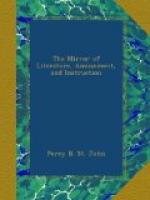It is somewhat singular, that though the population in these early days were but a handful in comparison to the present number, the redundancy of population was as bitterly complained of as it ever has been in modern days. About thirty years after Henry’s reign (Elizabeth) we learn from one Harrison, who wrote in 1577, that “a great number complain of the increase of povertie, laying the cause upon God, as though he were in fault for sending such increase of people, or want of wars that should consume them, affirming that the land was never so full. Some affirming that youth by marrying too soon do nothing to profit the countrie; but fill it full of beggars, to the hurte and utter undooing, they say, of the common wealth. The better minded doo forsake the realme for altogether, complaining of no room to be left for them at home.” If there was no room in Elizabeth’s time, what must be our present situation? Indeed the present crowded state of the metropolis, and the general closeness of the buildings, has frequently been a subject for regret, as tending to render it unhealthy and impure; but on referring to its state, when in comparison it was but a village, the old writers state that in the city, and all round it were a great number of pits and ditches, and sloughs, which were made the receptacle of all kind of filth, dead and putrid horses, and cattle, &c. In the time of Henry VIII. many parts are described as “exceedingly foul and full of pits and sloughs, and very noisome,” and some years after (1625) in a tract, the author says, “Let not carkasses of horses, dogs, cats, &c. lye rotting and poisoning the aire, as they have done in More and Finsbury Fields, and elsewhere round about the cittie. Let the ditches towards Islington, Olde-street, and towards Shoreditch and Whitechapel, be well cleansed.” In another tract published in 1665, it states, that “there are all sorts of unsavoury stenches, proceeding either from carrion, ditches, rotten dung-hills, vaults, sinks, nasty kennels, and streets, (strewed with all manner of filth) seldom cleansed.” From these statements it is evident that notwithstanding all the present inconveniences that the inhabitants of London live in more healthy situations now that they are surrounded by houses, than when they were exposed to extensive open fields.
A.B.C.
[1] It was reckoned an extraordinary
luxury for Thomas a Becket to
have
his parlour strewed every day with clean rushes.
* * * * *
A PORTRAIT.
Sketched in the year of the world, 5831; and, of my bachelorship, 24.
(For the Mirror.)
Chaste,
as the icicle,
That’s curded by the frost from
purer snow,
And hangs on Dian’s temple; Dear—old
maid.
SHAKSPEARE’S Coriolanus.
Sed mihi vel tellus optem prius ima dehiscat,
Vel Pater omnipotens adigat me fulmine
ad umbras,
Pallentes umbras Erebi, noctemque profundum,
Ante, pudor, quam te violem, aut tua jure
resolvam.




